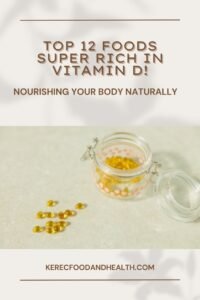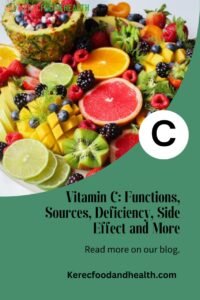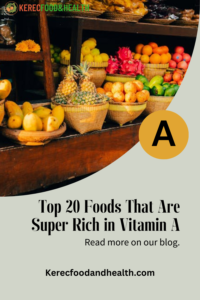Discover essential vitamins and nutrients that support better eye health. Learn how to enhance vision and prevent eye-related issues naturally.
Introduction
Even if you currently have no vision challenges, taking care of your eyes is crucial. Fortunately, maintaining eye health can be relatively easy if you incorporate foods that are beneficial for your vision into your diet, such as carrots, broccoli, palm oil, and salmon. However, if you find it difficult to maintain a balanced diet or need an extra boost of essential vitamins and nutrients, supplements may be a good option for you.
Vitamins A, B, C, D, and E, along with other nutrients, are vital for maintaining good eye health. Deficiencies in these vitamins can increase the risk of various eye conditions, including cataracts, glaucoma, and age-related macular degeneration (AMD). By taking supplements containing these vitamins and nutrients, you may help protect your eyes from developing these conditions.
This article will discuss the best vitamins, nutrients, and supplements you should consider adding to your daily routine to maintain healthy eyesight, as well as how to include them in your diet through various food sources.
Essential Vitamins and Nutrients for Better Eye Health
1. Vitamin A
Vitamin A is essential for good vision and overall eye health. Specifically, it plays a critical role in night vision by combating night blindness. As a component of the protein rhodopsin, vitamin A enables the eye to see in low-light conditions.
A deficiency in vitamin A can lead to night blindness and xerophthalmia, a progressive eye disease that begins with night blindness. If vitamin A deficiency persists, the tear ducts and eyes can dry out, and eventually, the cornea may soften, leading to irreversible blindness.
This vitamin supports corneal function and protects the surface of the eye. Individuals suffering from vitamin A deficiency may experience inadequate moisture production in their eyes, resulting in dryness.
You can find vitamin A in foods such as carrots, sweet potatoes, spinach, red peppers, pumpkins, squash, kale, and leafy green vegetables.
2. Vitamin C
Vitamin C is a powerful antioxidant that protects your eyes from oxidative damage caused by free radicals. It may also reduce the risk of developing certain eye conditions, such as AMD and cataracts, which cause clouding of the eye and impair vision.
Oxidative damage is responsible for two common age-related cataracts: cortical and nuclear cataracts. While cortical cataracts develop on the edges of the lens, nuclear cataracts occur deep within its center. Additionally, vitamin C protects the eyes from UV light damage.
Although vitamin C concentrations decrease in the eyes as you age, you can counteract this reduction by consuming foods rich in vitamin C and considering supplementation.
Your body requires vitamin C to produce collagen, a protein that provides structural support to your eyes, particularly in the cornea and sclera. Excellent sources of vitamin C include citrus fruits (oranges, grapefruit, tangerines, limes, and lemons), berries, bell peppers, and cruciferous vegetables like broccoli, spinach, and kale.
3. Vitamin E
Vitamin E acts as an antioxidant, helping to protect cells from damage caused by free radicals and potentially reducing the risk of cataracts and AMD. Alpha-tocopherol, one of the forms of vitamin E, possesses powerful antioxidant properties. It helps combat free radicals that can damage proteins in the eye and other tissues throughout your body.
Damage caused by free radicals can lead to cataract formation on the lens of the eye. Thus, a high intake of vitamin E-rich foods or supplements may lower the risk of developing cataracts.
Foods rich in vitamin E include cashews, walnuts, almonds, peanuts, tiger nuts, sunflower seeds, safflower oil, soybeans, corn, avocados, wheat germ oil, asparagus, and vegetable oils.
4. Vitamin D
Some studies suggest that vitamin D may reduce the risk of developing macular degeneration. You can obtain vitamin D from sunlight exposure, as well as from fatty fish, fortified dairy products, and egg yolks.
5. B Complex Vitamins
- Vitamin B1 (Thiamine):
While vitamin B1 is essential for overall health, its direct impact on eye health is less prominent than that of vitamins A or E. Vitamin B1 supports proper nerve function, including the nerves that control eye movements and transmit visual information to the brain.
Consuming foods rich in vitamin B1 may help alleviate symptoms of dry eye disease. Good sources include whole grains, legumes, nuts, and lean meats.
- Vitamin B2 (Riboflavin):
Vitamin B2 is an antioxidant that can reduce oxidative stress in your body, including your eyes, and help prevent cataracts.
Foods rich in vitamin B2 include oats, milk, yogurt, beef, and fortified cereals.
- Vitamin B3 (Niacin):
Research has established a link between lower intake of vitamin B3 and glaucoma. This vitamin plays a crucial role in preventing glaucoma, a condition characterized by damage to the optic nerve.
People suffering from glaucoma experience fluid buildup in the eyes, which increases pressure on the optic nerve and can lead to vision loss over time. Taking niacin supplements and consuming niacin-rich foods can effectively prevent glaucoma.
While niacin supplements should be used with caution (not exceeding 1.5 to 5 grams per day due to potential side effects like blurred vision, macular damage, and corneal inflammation), foods naturally high in niacin do not pose these risks. Food sources rich in vitamin B3 include beef, poultry, fish, mushrooms, peanuts, and legumes.
- Vitamins B6, B9, and B12
The combination of vitamins B6, B9, and B12 may lower the risk of developing AMD by reducing homocysteine levels. High homocysteine levels can increase inflammation and the risk of AMD. Foods rich in vitamins B6, B9, and B12 include beans, lentils, pork, fish, green peas, yogurt, dark leafy greens, peanuts, seafood, sunflower seeds, eggs, liver, red meat, poultry, and chickpeas.
6. Lutein and Zeaxanthin
Lutein and zeaxanthin are carotenoids found in high concentrations in the macula (retina) and lens of the eye. These antioxidants can help reduce oxidative damage in the retina and may protect against macular degeneration and cataracts. As such, they can lower the risk of developing AMD, cataracts, and glaucoma. Excellent sources of lutein and zeaxanthin include dark green leafy vegetables, spinach, kale, broccoli, egg yolks, corn, asparagus, lettuce, and peas.
7. Omega-3 Fatty Acids
The retina of your eye contains a high concentration of omega-3 fatty acids, which are beneficial for eye health. They help protect the retina from damage and reduce the risk of macular degeneration and dry eye syndrome. Omega-3 fatty acids are also used to treat dry eye syndrome, a condition in which the eyes do not produce enough tears for lubrication. You can find omega-3 fatty acids in fish such as salmon, mackerel, and trout, as well as in flaxseeds, chia seeds, and walnuts.
8. Zinc
Zinc is present in the retina, where it supports the maintenance of retinal cell membranes and protein structures. It facilitates the transport of vitamin A from the liver to the retina, aiding in the production of melanin, the pigment that protects the eyes from UV light. Consuming zinc-rich foods or supplements may help prevent or reduce the risk of developing AMD. According to the American Optometric Association, taking 40–80 mg of zinc daily, alongside certain antioxidants, can slow the progression of advanced AMD by 25%. Foods rich in zinc include nuts, beans, chickpeas, pumpkin seeds, whole grains, lean meats, turkey, seafood, oysters, crab, and lobster.
Bottom Line
It’s essential to note that these vitamins and nutrients are best obtained through a balanced diet rich in fruits, vegetables, and healthy fats. However, in cases where diet alone may not suffice, taking a multivitamin or specific eye health supplement may be beneficial. Always consult with a healthcare professional before starting any new supplements. If you’re experiencing vision problems, seek advice from an eye care professional for an accurate diagnosis and treatment plan.
Potential Risks of Vitamins for Eyes
While most vitamins and supplements are generally considered safe for most individuals, there are some associated risks. Therefore, it is advisable to consult with a healthcare professional before starting any new supplement regimen. These risks include:
1. Overdose
Taking excessive amounts of certain vitamins can lead to toxicity and adverse effects. For example, high doses of vitamin A can be toxic and may cause blurred vision, nausea, and dizziness.
2. Vitamin Interactions
Some vitamins and supplements can interact with medications, potentially reducing their effectiveness or causing side effects. If you are pregnant or breastfeeding, consult your healthcare professional before taking any vitamins, especially if you are already on medication. Your doctor can guide you to the best supplements and dosages.
3. Allergic Reactions
Some individuals may have allergies or sensitivities to specific vitamins or ingredients in eye supplements, leading to allergic reactions such as skin rashes, itching, or respiratory issues.
4. Interference with Medical Conditions
Certain eye conditions may worsen with the use of specific vitamins. For instance, individuals with macular degeneration may need to avoid high doses of certain antioxidants.
5. False Sense of Security
While vitamins can support eye health, they should not replace regular eye care or medical treatment. Relying solely on supplements may delay proper diagnosis and treatment of underlying eye conditions.
It is crucial to consult with a healthcare professional or eye specialist before starting any vitamin or supplement regimen to ensure they are suitable and safe for your individual needs.
Reference
- Jared Meacham and Beth Sissons. February 16, (2023). What are the best vitamins for eye health? https://www.medicalnewstoday.com/articles/326758
- Amy Richter and Makayla Meixner MS. February 16, (2023). The 9 Most Important Vitamins for Eye Health. https://www.healthline.com/nutrition/eye-vitamins.
- Caroline Igo. Oct. 2, (2023). The 6 Best Vitamins and Supplements for Eye Health. https://www.cnet.com/health/personal-care/best-vitamins-and-supplements-for-eye-health/.






Pingback: Cloudberries: Types, Nutrition, Benefits, Uses, and More
Pingback: Gooseberry: Types, Benefits, Uses, Side Effects, and More
Pingback: 20 Warning Signs of Serious Eye Problems You Shouldn't Ignore!
Pingback: Yuzu: Types, Nutrition, Benefits, Uses and Potential Side Effects
Pingback: Clementine: Types, Nutrition, Benefits, Uses and Side Effects
Pingback: Pineapple: Types, Nutrition, Benefits, Delicacy, and Side Effects
Pingback: Alfalfa Tea: Origin, How to Brew, Benefits, and Side Effects
Pingback: Coconuts: Types, Nutrition, Benefits, Uses and Side Effects
Pingback: 15 AMAZING HEALTH BENEFITS OF MANGO
Pingback: Avocado: Types, Nutrition, Benefits, Delicacy, and Side Effects
Pingback: Breadfruit: Nutrition, Benefits, Uses, Delicacy and Side Effects
Pingback: Jackfruit: Nutrition, Health Benefits, Uses, and Side Effects
Pingback: Build Strong Bones with These 16 Key Foods
Pingback: Best Foods for Cancer Treatment and Prevention
Pingback: Top 20 Foods to Boost Hair Growth
Pingback: 18 Superfoods for Natural Kidney Detoxification
Pingback: 8 Best Types of Pomegranate and Best Ways to Choose Them
Pingback: Raspberry: Types, Nutrition, Benefits, Uses, Side Effect and More